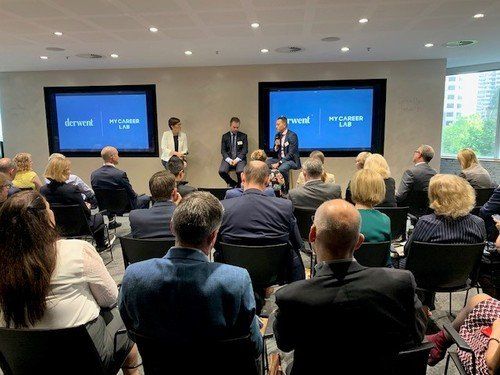News
Service NSW - Insights From A World Class Customer Service Transformation

Derwent and My Career Lab recently co-hosted an event on digital transformation, with Derwent Managing Partner Andrew McEnroe and My Career Lab Managing Director, Sharon Collins facilitating an engaging discussion on how Service NSW and the NSW Public Service Commission are achieving amazing results at scale.
Service NSW has been on a six-year journey to help create a one stop shop for their customers which included a change in the operating model. Damon Rees, CEO of Service NSW, talked about how focusing on customer centricity and embracing agile under the then ‘start-up’ culture of Service NSW has enabled them to shed their legacy of cumbersome processes and poor customer service, to becoming an agency known for exceptional customer experience and one of Australia’s best places to work. For organisations looking to tackle their own digital or service transformation he offered this advice;
“when you talk of big numbers like transforming a whole workforce it looks impossible, but instead you should stop focusing on the end game and getting there as quickly as possible and instead consider the small/high customer impact projects, pick your place to start and be obsessive with momentum.”
Scott Johnston, Acting Commissioner NSW Public Service Commission discussed how cultivating a culture of learning and customer focus has enabled them to undertake their own significant transformation for the 400,000 public servants in NSW and placing emphasis on the customer or citizen when implementing initiatives. Damon is now collaborating with Scott and the NSW Public Service Commission to try and replicate their success across the NSW Government as well as sharing and learning with the broader levels of Government and private sector organisations via forums such as this.
At the core of the discussion was making sure the culture is ripe for transformation, understanding the skills and capabilities of your employees and ensuring that your employees are your first consideration when developing any digital strategy, and understanding the importance of digital capability at all levels, not just in pockets.
Here is a summary of the insights shared:
- Design your customer service experience with your customers, not with your leadership team
- Genuinely follow your customer – start every conversation with empathy
- Create lean, agile, customer-centric product teams
- Foster a culture of learning and don’t be complacent, inertia can set in quickly
- Ensure all leaders are aligned in the high stakes game of digital transformation, from your HR leader to your Head of IT
- Think about reskilling relevant roles, I.e. frontline customer-facing staff into the digital team
- Focus on the physical and wellbeing of your employees
- Digital acumen needs to be part of every leader’s toolkit like financial acumen
- Be obsessed with momentum and velocity and pick your place to start
- Think of timeframes as to what can be done this week, next week and the end of the month - get stuff done!
Some reflective questions:
- What experience do you want your workforce to have?
- Ask your clients directly what they need from your service?
- How do we build a digital skillset in every one of our people?
- What is the learning program we can start piloting?
- Which roles in your organisation are being impacted by technology?

Share this article
Recent Articles





